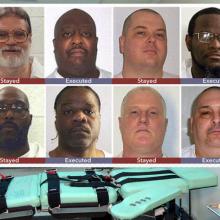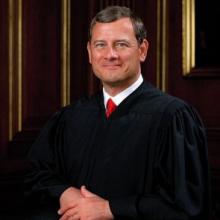arkansas
For 30 years before she was ordained, Rev. Morgan Gordy was a nurse in Georgia, Mississippi, and Tennessee. She saw the link between poverty and death firsthand, and it often came down to lack of access to affordable health care.
“If I’ve got money, and it’s easy for me to get over and give them money, I do,” Thun said. “What the Lord taught me is, I have a responsibility to give. What they choose to do with the money is between them and the Lord, and he can work with them in regards to stewardship.”
Griffen is still flummoxed how a ruling on a routine property case coupled with participation in his church’s Good Friday prayer vigil put him in the eye of a political storm — one that may now cost him his job. But he suspects the issue goes deeper than whether or not he impartially followed the law.
You might think these men were sentenced to death and slated for execution simply because of the gravity of their crimes. You’d be wrong.
There is something beyond the terrible crimes that determined their fates even more so: poverty. The death penalty preys on poor and vulnerable populations.
“Many of the findings of the commission’s year-long investigation were disturbing, and led commission members to question whether the death penalty can be administered in a way that ensures no innocent person is put to death,” according to the in-depth report.
On the Monday after Easter, as the state of Arkansas fought a stay of execution for seven prisoners in order to put them to death, I meditated on a simple truth: When people are executed, Christ is crucified all over again.
Arkansas carried out back-to-back executions on Monday night, administering lethal injections to two men convicted of rape and murder to become the first U.S. state to put more than one inmate to death on the same day in 17 years. Marcel Williams, 46, was pronounced dead at 10:33 CDT, a little more than three hours after the execution of 52-year-old Jack Jones, according to officials at Cummins Unit prison, about 75 miles southeast of the state capital, Little Rock.
Arkansas, which has not conducted an execution in 12 years, at one point had planned to execute eight inmates in 11 days, the most of any state in as short a period since the U.S. Supreme Court reinstated the death penalty in 1976.
Rutledge claims that nothing is in place preventing the next five executions, according to the AP. She says she will continue to fight against any legal challenges hindering the executions.
A U.S. judge in Little Rock on Saturday temporarily blocked plans by Arkansas to hold a rapid series of executions this month, after the inmates argued the state's rush to the death chamber was unconstitutional and reckless.
The last time a U.S. state tried to execute two inmates on the same day, a poorly secured intravenous tube popped out, lethal injection chemicals sprayed in the death chamber, and staff said the pressure of dual executions exposed flaws in the protocol. That scenario in 2014 in Oklahoma, where executions are now on hold, has not stopped Arkansas from pursuing an unprecedented plan to put eight inmates to death in back-to-back lethal injections on four days this month.
As it is, white evangelicals made up a little more than a quarter of those who turned out to cast their ballots. And by winning 81 percent of their vote, Trump was assured the presidency.
Now, evangelicals are expecting much in return from a president-elect who did not mention God in his victory speech, who was “strongly” in favor of abortion rights until he was against them, who has said he does not believe in repentance, who has made lewd comments admitting to sexual assault.
While reflecting upon and celebrating Easter, I did quite a bit of thinking about the controversies surrounding so-called “religious freedom” bills that have been popping up recently, most notably Indiana and Arkansas. In a recent interview on the Family Research Council radio program, “ Washington Watch with Tony Perkins," former Arkansas Governor Mike Huckabee discussed the backlash against these two pieces of legislation.
Huckabee asserted that gay-rights activists are seeking the eradication of Christian churches. According to Huckabee, “It won’t stop until there are no more churches, until there are no more people who are spreading the Gospel.”
Christianity has been and continues to be the dominant form of religious practice and expression in America. Often the rhetoric used by members of dominant groups insinuates that when people outside of their dominant group ask for equal rights and the opportunity to participate fully in American life, they are actually seeking to eradicate the existence of that dominant group.
In some ways, the case of the Muslim prisoner who wants to grow a beard seems easy. When it comes to a prisoner’s religious rights, federal laws favors accommodation when possible.
So how could Gregory Holt — known as Abdul Maalik Muhammad after his conversion to Islam — possibly lose at the Supreme Court, where the justices heard his case on Oct. 7?
Holt wants to grow a mere half-inch beard — a length of whisker allowed in the vast majority of state prison systems, but not the one where he is incarcerated: Arkansas.
Even Chief Justice John Roberts wondered how such a seemingly straightforward case came before the high court, which usually occupies itself with the thorniest of legal questions.
The Supreme Court’s decision to sit out the legal battle over same-sex marriage will — for now, at least — leave the future of laws prohibiting gays and lesbians from marrying in the hands of lower state and federal court judges. But it also almost certainly means the couples challenging those laws are more likely to win in the end.
The court said Oct. 6 that it would not hear appeals from five states whose same-sex marriage bans had been invalidated by lower federal courts. The decision, issued without explanation, will likely lead to recognition of gay marriages in 11 more states. It also allows an avalanche of legal challenges to the remaining bans to keep going forward in state and federal courts, where gay and lesbian couples have overwhelmingly prevailed.
The court’s decision leaves unchanged 20 state laws blocking same-sex unions. Each is already under legal attack, facing challenges in state or federal court, and sometimes both. Challenges to marriage bans already have reached a handful of state appeals courts and the federal appeals courts for the 5th, 6th, 9th and 11th circuits.
Some of those judges had been waiting to see what the Supreme Court would do. The court’s instruction Oct 6. was: Proceed.
When the ExxonMobil Pegasus pipeline split open in late March it spilled 210,000 gallons of oil into a small Arkansas town. The spill galvanized opponents of the Keystone XL Pipeline, who cited its planned path through major rivers and aquifers. Activists say TransCanada, which would build and operate the pipeline, underestimate the size of potential spills.
"I don't agree with people who say a spill into the aquifer will ruin the whole aquifer. It would ruin a very small piece, but it's important if that's your small piece," John Stansbury, a University of Nebraska professor of environmental and water resources engineering. "But if it got into a major river, it could create a plume hundreds of miles long."
Read more here.
Residents of Mayflower, Ark., spent Easter weekend evacuated from their homes as Exxon Mobil attended to a major oil spill from a crude oil pipeline. Residents described scenes of oil running down the streets like a river, as 22 families were forced to leave their homes.
Since the pipe burst on Friday afternoon, cleanup crews have collected around 12,000 barrels of oil and water. Images from the weekend show quiet cul-de-sacs inundated with thick, black sludge, and parents reported concern for their children and whether they would be able to play outside.
The Arkansas Senate has passed a bill that lifts a ban on carrying concealed weapons in church.
The proposal, which goes to the Arkansas House for consideration, would allow churches to decide which, if any, worshippers with concealed carry permits can bring their firearms inside.
The measure passed 28-4 on Monday Jan. 28, KATV reported.















